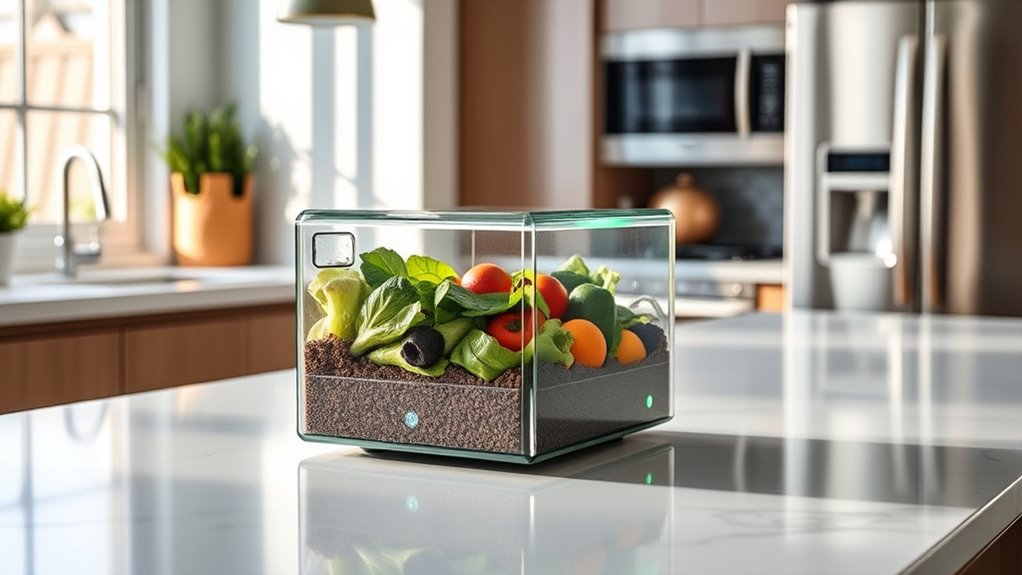Counter-top bioreactors make kitchen composting simple by turning food scraps into nutrient-rich compost indoors, without odors or pests. They use controlled environments with sealed chambers, filters, and aeration to manage moisture, temperature, and airflow. This creates an efficient, eco-friendly system that speeds up decomposition, especially with worms that break down waste quickly. If you continue exploring, you’ll discover how to best set up and maintain your compact composting system for sustainable gardening.
Key Takeaways
- Counter-top bioreactors efficiently convert kitchen waste into nutrient-rich compost through an enclosed, odor-controlled environment.
- They utilize red worms and microbes to quickly break down organic scraps, creating a sustainable ecosystem.
- Built-in filtration and moisture regulation prevent odors and pests, making indoor composting odor-free and easy.
- Design features like ventilation and moisture controls ensure optimal conditions for worms and microbial activity.
- Regular maintenance, such as aeration and balancing carbon materials, enhances compost quality and simplifies the process.

Have you ever wondered how to turn kitchen waste into something beneficial? With the rise of kitchen composting, especially using modern counter-top bioreactors, it’s easier than ever to recycle your scraps and reduce waste. One effective method you might consider is worm composting, which uses red worms to break down organic material quickly and efficiently.
Transform kitchen waste into nutrient-rich compost with worm composting and modern counter-top bioreactors.
When you set up a worm composting system, you create a mini ecosystem where worms eat your vegetable peels, coffee grounds, and other kitchen scraps, transforming them into nutrient-rich compost. This process isn’t only eco-friendly but also incredibly fast—worms can process waste in just a few weeks. Plus, many modern bioreactors are designed to incorporate worm composting easily, making the process more accessible for beginners.
A key concern with composting indoors is odor control, and the good news is that a well-designed counter-top bioreactor can handle this challenge effectively. These systems typically feature sealed chambers and filters that trap smells, preventing any unpleasant odors from escaping into your kitchen. As the organic waste decomposes, microbes and worms work together to break down the material without producing foul smells.
Maintaining proper balance—adding enough carbon-rich materials like shredded paper or dry leaves alongside your kitchen scraps—further reduces odors. Regularly aerating the compost and not overloading the system also help keep odors at bay. The result is a clean, fresh-smelling setup that allows you to compost without worrying about your kitchen becoming smelly or attracting pests.
Additionally, the science behind these bioreactors shows that managing moisture levels and temperature is vital for odor control and efficient composting. A well-designed counter-top unit will have built-in mechanisms for moisture regulation and ventilation, ensuring the environment remains ideal for worms and microbes. When conditions are just right, decomposition happens smoothly, and odors stay contained.
Choosing a system with odor control features means you won’t need to worry about frequent cleaning or unpleasant surprises. It also makes indoor composting more convenient and less intrusive, encouraging you to compost regularly and make the most of your kitchen waste.
In the end, turning your kitchen scraps into compost using a counter-top bioreactor with worm composting and odor control features simplifies the process. You get the satisfaction of reducing waste, creating nutrient-dense soil for your plants, and doing your part for the environment—all from the comfort of your kitchen.
With a bit of initial setup and regular maintenance, you’ll find composting becomes a straightforward, rewarding part of your daily routine.
Frequently Asked Questions
How Long Does It Take for Compost to Be Ready?
You might wonder how long it takes for compost to be ready. Typically, compost reaches maturity in about 2 to 4 months, depending on your microbial activity and materials used.
As microbes break down organic matter, the compost becomes dark, crumbly, and earthy-smelling.
Regular turning and maintaining proper moisture levels speed up microbial activity, helping your compost mature faster.
Keep an eye on it, and you’ll have nutrient-rich soil in no time.
What Types of Waste Are Suitable for Bioreactors?
In a world where composting is king, you wonder what waste suits bioreactors. You should toss organic waste like fruit peels, coffee grounds, and vegetable scraps into your device.
Avoid non-biodegradable materials such as plastics, metals, or glass, as they can harm the process. This way, you optimize your compost, turning kitchen scraps into rich soil, and help reduce landfill waste efficiently.
Is There Any Odor During the Composting Process?
You might wonder if there’s any odor during composting. With proper odor control and smell management, you won’t notice strong smells.
Bioreactors are designed to minimize odor by maintaining ideal conditions for decomposition, reducing unpleasant odors. Regularly adding carbon-rich materials and ensuring proper aeration helps keep the process odor-free.
How Often Should the Bioreactor Be Maintained?
Did you know that regular maintenance can extend your bioreactor’s lifespan by up to 30%?
You should follow a maintenance schedule of about once a week, ensuring you clean the bioreactor thoroughly to prevent odors and buildup.
Consistent bioreactor cleaning keeps the composting process smooth and odor-free, so set reminders and stay on top of your maintenance routine.
This keeps your kitchen eco-friendly and odorless.
Can Composting Reduce Overall Household Waste Volume?
Composting can substantially reduce your household waste volume by turning food scraps into valuable compost. When you compost, you divert waste from landfills, helping reduce methane emissions.
This process promotes food waste reduction and supports environmental sustainability. By using a counter-top bioreactor, you make composting convenient and efficient, encouraging consistent waste diversion.
Conclusion
By incorporating a countertop bioreactor into your daily routine, you can reduce food waste by up to 30%, making a real difference for your environment. Not only does this method simplify composting, but it also speeds up decomposition, turning scraps into nutrient-rich soil in just a few weeks. So, next time you toss food in the trash, remember that your small change can have a big impact—helping you compost easily and sustainably right at home.










